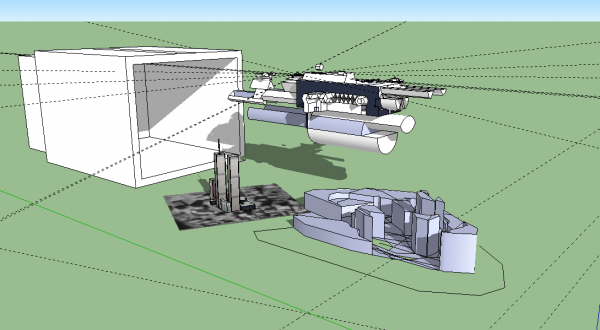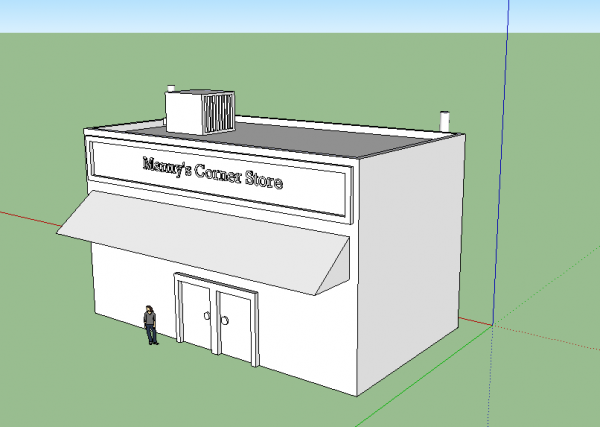Reposted with permission from my school’s monthly magazine, the Imprint.
Stratford Hall is not a school that uses carrots and sticks to get students to perform. Instead, we generally rely on building on students’ intrinsic motivation to learn. Daniel Pink, a researcher in the area of what motivates us all, says (in his book Drive) that when people are working on work “which requires even rudimentary cognitive ability,” they are actually demotivated by reward systems. Instead, Pink suggests, people are motivated strongly by the ability to demonstrate autonomy, mastery, and purpose. You can watch a summary video of his ideas here:
Autonomy
For me, autonomy means that students need to have some choice in what they do. I’ve noticed that my students tend to put more effort into assignments for which they have some opportunity for choice, and the ability to demonstrate their creativity.
For example, we did an assignment at the beginning of Science 8 last year where students had to “use a creative method to help remember the parts and functions of a cell.” Some students wrote haikus, some students did raps, and some students created videos. As the assignment was formative in nature, I never graded the submissions, except to give students descriptive feedback about their work. We shared the work in class. That unit we did a summative assessment on the parts of a cell, and most students achieved a 6 or 7 (note: 7 is the maximum score for an assessment in the International Baccalaureate). What was even more interesting to me was that, about seven months later, one of the students discovered the video of her rap. On her own time, and completely without any push from me, she decided to redo her rap video. She spent another several hours working on her video and then re-shared the new video with the class. Before this exercise, I couldn’t have imagined a student taking a prescriptive assignment and ever giving it another thought.
Mastery
Mastery means that we want to get better at doing things. It’s fun to become an expert at something, which is why so many of our students practice playing music on their own time. They have complete control over their learning, and they can see themselves improving. I think we do this really well. We have lots of opportunities at Stratford Hall for students to find things that interest them and to follow those interests. We have the PYP exhibition in 5th grade, the MYP personal project in the 10th grade, and the extended essay in the IB Diploma, for example. We also have a rich variety of elective subjects, especially considering the size of our school. These elective subjects are crucial for allowing students to follow their passions and develop mastery.
Purpose
Purpose is a key element of motivation as well. In schools, for me, this means that the learning students do has relevance, and that there is an obvious result and effect students can see from what they do. For example, Harry Armstrong in grade 11 is working to help run the MUN club. He gets nothing for this (except possibly a small bonus to his likelihood of being accepted to college because of his extra-curricular activities) and it takes a huge amount of time. We were exchanging emails over the weekend about what we were going to do on Tuesday, and it was clear by the discussions that happened during the day that a lot more emails had been exchanged amongst the students that I hadn’t been included on. Harry does this work for the MUN because he sees that he has an important role to play, and that the activity has purpose. He wants the younger students to get better at debating and to understand how the MUN functions.
More generally, we see purpose in our global outreach. Many of our students work extra hard to help make that program function, and, although I know the excitement of going to a far-away place is the draw for some of them, when they come back from their trips it is interesting to see how many of them continue to work hard for the program. The learning doesn’t stop at the end of the trip; it continues, hopefully, for the rest of their lives.
So if we want students to become more self-directed in their learning, and more motivated to work hard to succeed, we need to find ways to give them autonomy, mastery, and purpose.

(Created by a Stratford Hall student in 6th grade)
One way that we do this is through the use of technology. Students are able to practice using technology skills over a number of years, and will master various forms of technology. They are given the opportunity for autonomy through the enormous amount of choice and opportunity to be creative through different technologies. Further, they can see purpose in what they do, given that learning the uses of technology is helping to prepare them for a future outside of our school.
For example, during Arts Week, we had a session on using Google Sketchup to create artwork for video games. Once they had some of the basic skills in place, they were given the instructions, “play with this and see what you can get.” Afterwards, they attended a workshop wherein the CEO of a small special effects company provided some background on what goes into creating special effects for movies, and students could see from the style of artwork he presented that a tool like Google Sketchup could be useful in sketching out ideas for use in movies.

(Created by a Stratford Hall student, 12th grade)

(Created by a Stratford Hall student, 12th grade)
There are also some interesting examples of using technology in Photography class, for example, where Mr. Wheeler’s students have no limits to their imagination.

(Created by a Stratford Hall student, 9th grade)
I’d also recommend checking out this excellent video by some of our grade 9 Global Challenges students. http://wees.it/watercrisis
RJ Johnson - 21st Century Appreciative Inquiry says:
I have just begun to allow free project choice in the college-level computer programming courses I teach and I too have been stunned by the huge increase in passion and interest. The students work mainly in groups and are creating programs from all sorts of domains. Once they get an idea that they want their program to have a certain feature, they are like bulldogs until they get it working. The biggest challenges for me have been having the faith that by the end of the term they will have advanced greatly and the new concepts that I have to learn to help them with their goals.
Keep up the great work,
RJ Johnson
March 25, 2011 — 9:05 am
David Wees says:
Yeah what a concept eh. Let them program what they want, focus on building their skills, and then hope that they will pick up some of the expected course content & skills for later. Please let me know how successful this approach is, as I am planning a possible robotics & technology course for next year.
March 26, 2011 — 11:15 pm
RJ Johnson - 21st Century Appreciative Inquiry says:
David,
The term is finished, and for the most part, the results were impressive. One group of participants created a game that was over 1300 lines of programming. This far exceeded past results. Other participants created programs based on concepts that were never covered in the course. The only real change to make is to move more gradually to such a participant-centered model and to provide more structure up front on the approach. I would like to share a quote from one participant that I also posted on Joe Bower’s blog. Here it is:
“The lack of regular assignments due on a weekly basis kind of struck me as odd. But as the course progressed, I noticed that the main emphasis was placed on learning, and not so much of just going through the course with the main objective to receive one’s desired grade and move on to the next course. I actually found this to be helpful in several ways. First, the emphasis on learning as opposed to working for a grade inspired me to actually try to figure out what I was doing and how the different elements of programming work as opposed to my usual (and admittedly poor) method of simply figuring out the best way to earn the grade I want. Second, it gave me freedom to not be pressured by deadlines and circumvented a lot of the stresses that I can sometimes encounter during a semester.”
Please keep us informed of how the robotics course goes.
Best regards,
RJ Johnson
May 13, 2011 — 1:51 pm
David Wees says:
It actually looks like the Robotics course isn’t going to happen, but we may try and revive it as a club instead. I’m glad to see you mostly got good results.
May 13, 2011 — 8:24 pm
Christina Henson says:
My name is Christina Henson and I am a K-6 Education student in Dr. Strange’s EDM310 class at the University of South Alabama. I enjoyed reading your post. I was surprised to see that cognitive thinking and performance were not enhanced in the least by a monetary reward. I owned a mortgage company for the past 13 years before I closed the company and started back to school to acquire a degree in education. In the past, I always paid my employees based on a percentage of their performance. You can only imagine how this piece of information would have reshaped my thinking if I would have read it while I was still in business.
However, a lot of the concepts Daniel Pink spoke about were the exact reasons we were in the mortgage business. Our jobs had a lot of flexibility and even employees were very much their own boss. We paid senior employees more money because they had mastered their craft. However, the mastery of the craft is exactly what has kept several of the mortgage veterans in the business. It could even be argued, maybe to their detriment. The market is sputtering and it is not exciting and fun anymore. Everyone comes to work with serious faces and on edge. With that being said, I agree wholeheartedly that we all desire to master our craft and be looked up to as the expert in our field. It makes us feel valuable and important. Sometimes that seems to be the only thing that keeps us going, even when the going gets tough.
March 26, 2011 — 3:15 pm
David Wees says:
Hopefully you will find this new information about motivation will help shape your new career. You will find that you are entering a career where the managers at the very top do not believe the research that Daniel Pink has collected on motivation and are pushing for merit pay. Similarly there are many educators who use reward & punishment systems in the classroom, some of them with seeming success. However, over my years teaching I have found that my experience agrees with the research Daniel Pink has brought together; the deepest learning and engagement comes from paying attention to a student’s internal need for finding purpose, mastery, and especially autonomy in their learning.
March 26, 2011 — 11:08 pm